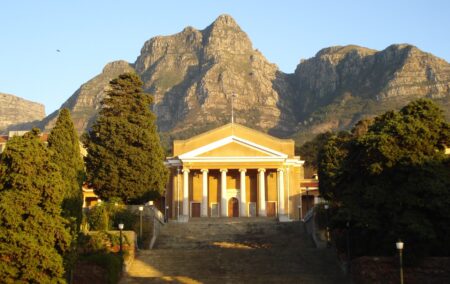The University of Cape Town (UCT) alumni community is buzzing with petitions, calls to action, and open letters in response to the UCT Council’s June 2024 decision to prohibit UCT academics from establishing or maintaining relations with “any research group and/or network whose author affiliations are with the Israeli Defence Force, and/or the broader Israeli military establishment”.
This “relations resolution” is riddled with undefined terms, leading to widespread confusion about its practical implications. Its vagueness has sparked legal challenges, with proceedings under way to review whether the decision adheres to principles of fair and lawful decision-making by a university. Critics allege that the UCT Council is infringing on fundamental constitutional rights, including academic freedom. UCT Council has called the criticism “misleading and hyperbolic”.
The surge in alumni activism reflects the deep care stakeholders have for UCT’s future. Some prioritize UCT’s moral righteousness, while some advocate for UCT to remain apolitical. Many value the academic freedom to collaborate with global networks, including Jewish, Muslim, or Christian Israeli colleagues. Others are concerned about securing funds to attend classes, ensuring UCT can pay lecturers and staff, sustaining clinical trials, and preserving free speech to openly debate the Gaza-Israel conflict while engaging with academics from those regions.
These stakeholders, whom the UCT Council is obligated to consult, were seemingly overlooked before the Council passed a resolution with far-reaching, divisive, and financially impactful consequences. When faced with a similar decision in the past, the council sought a legal opinion for guidance – an opinion alleged by Prof Mendelsohn to have been ignored in the decision to pass the 2024 Gaza Conflict resolutions.
UCT has committed itself to inclusivity, engaging stakeholders like students, alumni, and donors, as outlined in its internal policies. Internationally, UCT subscribes to the Ten Principles of the UN Global Compact, while nationally, it is bound by the King IV Guidelines on Good Corporate Governance and the Higher Education Act of 1997, which mandate stakeholder consultation on decisions that pose risks to the university. Yet, no such consultation occurred – no online survey (unlike in 2019), no emailed voting forms, not even an informal social media query.
A Change.org petition by “Concerned Citizens for Academic Freedom at UCT,” with approximately 69,600 signatures, appeals to UCT’s legacy as an institution that fosters intellectual individuality, where students are valued as individuals, not as representatives of cultural or religious groups. The petition warns that boycotting Israeli universities fuels radical identity politics, threatening to fragment campus life and create parallel communities, an outcome at odds with the university’s past and envisioned future.
On April 30, 2025, “UCT Alumni for Palestine” issued an open letter to the Chairperson of the UCT Council and Vice-Chancellor Professor Moshabela, expressing outrage at efforts to overturn the Gaza Conflict resolutions. Signed by Yusuf Gabru and Eugene Cairncross on behalf of the group’s ad-hoc committee, the letter urges UCT leadership to reject any attempts to review, rescind or undermine the resolutions, calls on the Vice-Chancellor to disassociate himself from the Concerned Citizens’ petition, and demands public denouncement of funding withdrawals. It further insists that UCT clearly articulates its legal and moral obligations under international law and International Court of Justice (ICJ) rulings.
The need for clear articulation is a recurring theme.
As an aside, regarding the ICJ rulings, no genocide findings have been made, as clarified by former ICJ Judge President Joan Donoghue: “The court emphasized a risk of irreparable harm to the Palestinian right to be protected from genocide, but the shorthand that there’s a plausible case of genocide isn’t what the court decided.”
Returning to the activism, the UCT Association of Black Alumni (UCTABA) met with the Vice-Chancellor on March 26, 2025, where funding challenges were discussed. The Vice-Chancellor noted Jewish students transferring “en masse to Stellenbosch” and the difficulty of filling funding gaps as donors withdraw support. According to UCTABA’s notes, “An institution like UCT needs guardians, and some influential Jewish guardians are actively shifting away. UCT needs new guardians.”
UCTABA’s Deputy President, Advocate Rod Solomons, issued a statement unequivocally supporting the June 2024 resolutions, urging UCT to prioritize partnerships with Global South nations, BRICS allies, and progressive institutions aligned with its values. This shift, UCTABA argues, will bolster financial resilience and align funding with UCT’s mission of equitable global engagement. However, from a corporate governance perspective, it’s unclear whether Solomons consulted UCTABA members before issuing this statement “on behalf of the UCTABA family.” Was a referendum conducted to gauge members’ views, especially given the Vice-Chancellor’s insights and the university’s earlier funding crisis?
Meanwhile, over 180 UCT alumni have written to Vice-Chancellor Moshabela, UCT Council Chairperson Advocate Norman Arendse, and UCT Alumni Advisory Board Chair Dianna Yach, raising concerns about funding cuts exceeding R750 million. This was prior to reports of the National Institutes of Health (NIH) reducing medical research funding, including for UCT. Some argue that council members who opposed rescinding the Gaza Conflict resolutions in March 2025 are failing to fulfill their fiduciary duty to act in UCT’s best interests.
The stakeholders are speaking. Is UCT listening?
[Image: https://www.flickr.com/photos/barbourians/5830239810/in/photostream/]
The views of the writer are not necessarily the views of the Daily Friend or the IRR.
If you like what you have just read, support the Daily Friend

